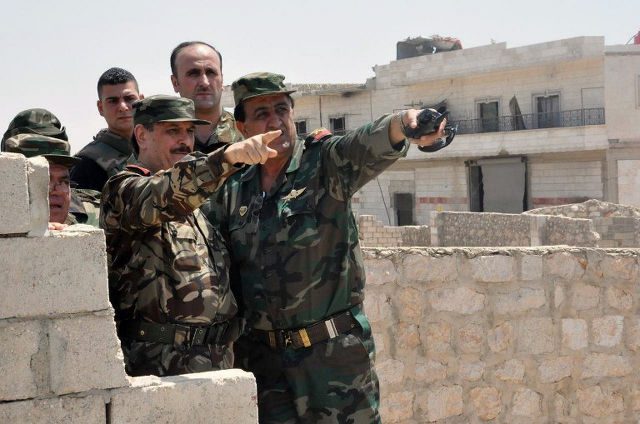SUMMARY
This is AI generated summarization, which may have errors. For context, always refer to the full article.

BEIRUT, Lebanon – Talks aimed at ending Syria’s nearly six-year war are set to open on Monday, January 23, in the Kazakh capital, brokered by regime allies Russia and Iran and rebel backer Turkey.
Here is a breakdown of the forces involved in the complex civil war:
Regime and allies
The Syrian army’s 300,000-strong pre-war force has been halved by deaths, defections and draft-dodging.
It is bolstered by 150,000-200,000 irregular fighters and supported by 5,000-8,000 men from Lebanon’s Shiite militia Hezbollah, as well as Iranian, Iraqi and Afghan fighters.
Key regime backer Russia began an air campaign in support of President Bashar al-Assad in September 2015 and has helped Damascus recapture several key areas, including Aleppo city.
Iran has also provided major financial and military support to Assad.
The government controls 34 percent of Syria’s territory, including key cities such as Damascus and second city Aleppo. Of the 16 million Syrians who remain in the country, 65.5 percent live in regime territory.
Rebels
Syria’s opposition comprises a wide range of factions, including moderate rebels and Islamist groups.
Estimates of its total number of forces range from tens of thousands up to around 100,000.
Early on, rebels coalesced under the banner of the Free Syrian Army (FSA) but since then the opposition has splintered.
The most powerful non-jihadist group is Ahrar al-Sham, with a commanding presence in Idlib and Aleppo provinces.
It espouses a hardline Islamist ideology and is allied with the jihadist Fateh al-Sham Front in Idlib where they lead the Army of Conquest alliance.
Another key opposition group is the Saudi-backed Jaish al-Islam (Army of Islam). One of its leading figures, Mohammad Alloush, will head the opposition delegation in Astana.
Rebels now hold only around 13 percent of the country, including areas where they are allied with Fateh al-Sham, according to Syria expert Fabrice Balanche. (READ: Syrian army advances as rebels put peace talks on hold)
Around 12.5 percent of Syria’s remaining population lives in rebel-held territory.
Jihadists
There are two rival jihadist forces: the Islamic State group and former Al-Qaeda affiliate Fateh al-Sham Front.
ISIS emerged from the chaos of the war to seize control of large parts of Syria and Iraq in mid-2014, declaring an Islamic “caliphate”, committing widespread atrocities and carrying out or inspiring deadly attacks abroad.
Under pressure from an air war launched two years ago by a US-led coalition and fighting on multiple fronts, ISIS has suffered major losses but still controls significant territory in northern Syria, including its de facto capital Raqa. (READ: ISIS territory shrinks 12% since start of 2016 – British think-tank)
Fateh al-Sham Front split in July 2016 from Al-Qaeda in a move analysts said was aimed at easing pressure from both Moscow and the US-led coalition which have regularly targeted its forces with air strikes.
Many Syrian rebels have joined Fateh al-Sham, drawn by its financial means and organizational skills.
The Kurds
Syria’s Kurds have largely stayed out of the conflict between the government and armed opposition, carving out a semi-autonomous region in north and northeastern Syria.
Their People’s Protection Units (YPG) have become a key partner of the US-led coalition fighting ISIS as part of the Kurdish-Arab Syrian Democratic Forces (SDF).
The YPG controls about 20 percent of Syrian territory but as much as three-quarters of the northern border with Turkey. Two million people, around 12.5 percent of Syria’s remaining population, live in Kurdish-held territory.
The SDF has launched a drawn-out offensive against ISIS’s stronghold in Raqa.
Turkey launched an offensive into Syria in August 2016 against ISIS and the YPG, which Ankara regards as the Syrian branch of the Kurdistan Workers’ Party (PKK) that has waged a 32-year insurrection inside Turkey.
Turkey, Saudi Arabia, Qatar
Sunni-majority Saudi Arabia, Qatar and Turkey have provided military and financial support to rebels fighting Assad, who belongs to the minority Alawite community linked to Shiite Islam.
In the run-up to the Astana talks, co-hosts Turkey and Russia have taken steps to coordinate their involvement in Syria.
They brokered a fragile ceasefire between rebels and regime forces that took effect across Syria on December 30 but which excludes jihadists.
Earlier this month, Ankara and Moscow struck a deal to prevent clashes between their warplanes over Syria and on January 18 launched their first joint air strike against ISIS there.
International coalition
A US-led coalition has carried out air strikes against ISIS and other jihadists in Syria since 2014. (READ: Who’s who in the fight against the Islamic State group)
The coalition’s members include Australia, Bahrain, Britain, Canada, France, Jordan, the Netherlands, Saudi Arabia, Turkey and the United Arab Emirates.– Rappler.com
Add a comment
How does this make you feel?
There are no comments yet. Add your comment to start the conversation.